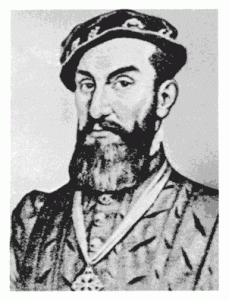I think that one of the most important of Smith and Watson’s concepts that applies to Cabeza de Vaca’s narrative of his travels in the Americas is memory. Some classmates have made the argument that his entire autobiographical account is essentially addressed to the king as a kind of explanation for a failed expedition. Others suggested that perhaps he was simply a product of his time, recounting situations in such a way that would be culturally acceptable. Because his narrative was not written until his return to Spain, his memory of this event is very pertinent to both of these observations.
I think that it is really interesting that Cabeza de Vaca never actually admits to having forgotten any particular part of the expedition or as Smith and Watson state, “call attention to things forgotten, times irretrievable” (245). In fact, it is rather remarkable how much he actually recounts with complete certainty about details from at least 10 years passed, such as conversations held with people, the exact amount of captives they took at certain areas along the trip, if the captives were chieftains or handsomer than the last group, the exact types of native housing, and the amount of men at certain parts of the trip, etc. While I think that it is important that we allow for the possible veracity of many of his statements, I also think that it is difficult to believe he recalled such exact data having been “a man who left those lands naked” with only his memories to offer to the king (4). I’m not sure Cabeza de Vaca is at all self-reflexive about the problem of remembering and I think that this may present a problem for a lot of modern day readers. Though he does say ‘give or take one or two’ sometimes, he is generally consistent in his presentation of memory as fact.
I definitely don’t want to suggest that I don’t believe Cabeza de Vaca’s overall story or be overly critical of his narrative. It is important to remember that this was his life– he spent his years and career braving foreign territory. It is possible that he definitely made a point to remember certain things correctly and perhaps even created some kind of system to remember specific details and events, but I also think that it is important to not overlook the significance of such concepts as memory and especially, the idea of self-awareness regarding forgetfulness within story-telling. Also, how does the fact that there was only four survivors of this entire affair serve to free Cabeza De Vaca’s ability to tell this story in any way he’d like? I found myself questioning if there were any substantial checks on his account of these travels. Like others, I suspect that he did alter some things to make himself look better in the eyes of the king, but I wonder what details exactly and if he did this in an unfair way, or if it even really matters. In regards to what was expected of people subject to royalty and religion at the cost of death or absolute poverty, how honest can we deem any writer during that time to be?
Is this a cut and dry presentation of the actual goings-on in this new world? And, does it have to be in order to tell us about the reality of that time? Only Cabeza de Vaca and those travelling with him really know what happened on that journey. For Cabeza de Vaca’s part, he did directly address critics like me with the comment that though there are “things very difficult for some to believe, they may believe them without any doubt; and may fully believe that throughout I have made my account rather short than long, and suffice it to say that I have offered the account to Your Majesty as truth” (4). And that’s an incredibly hard statement to ignore.


